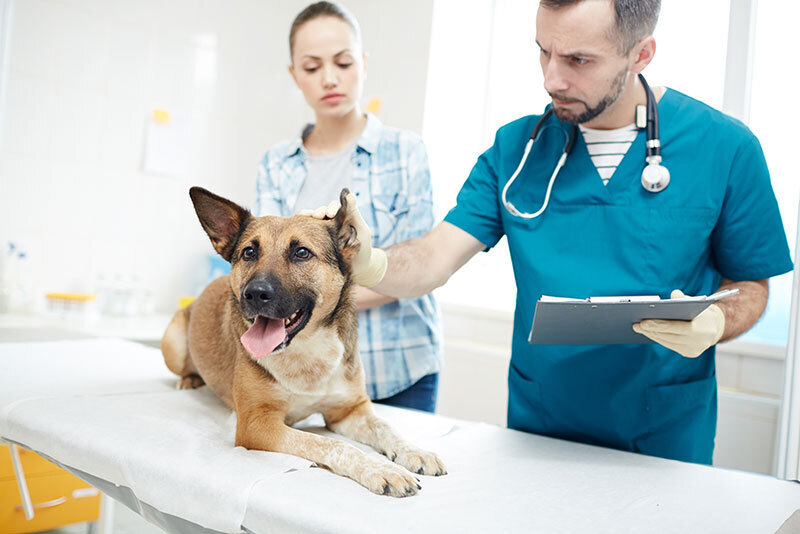4 Ways to Prepare Your Pet For Routine Blood Test

Blood can be a rich river of information for both humans and pets.
Blood tests can help us understand aspects of our overall health that may not be obvious on a physical exam. It can help us reveal, catch, and treat health problems early to deal with them proactively and have a better quality of life. The same is true for our pets.
Contrary to popular belief, routine blood tests are just as essential for healthy pets as they are for sick pets. Getting your pet's blood work done while they are still young and healthy gives your veterinarian a reliable baseline to compare results with when they get older or get sick.
When done routinely, blood tests can help veterinarians detect potential diseases before they become more severe. Most pet diseases are manageable with treatments such as medication and dietary modifications if caught early.
Preparing your pet for their blood test appointment can help make sure you get proper advice or diagnosis from your veterinarian. You can also save time and money by preventing inaccurate readings and eliminating the need to repeat the test. Here are four ways you can come in prepared for your pet's blood test appointment.
1. Ask Your Vet For Any Specific Instructions Before Your Appointment
It's always a good idea to ask your vet about any information you may need to know before your appointment. A few good things to know beforehand are whether or not your pet should fast and for how long, other tests or lab work that can or should be done at the same time, and whether or not you need to bring any of your pet's paperwork or samples (fecal or urine, for instance) with you to the appointment.
Don't hesitate to talk to your veterinarian about specific concerns you may have about the procedure or your pet's current health and history. Discussing these things ahead of time will give your veterinarian a heads up on specific markers in the blood to pay closer attention to.
2. Have Your Pet Go On A Gentle Fast
Just like you would when you get your blood drawn for routine and specialized blood tests, your pet also needs to fast beforehand. Fasting ensures that contaminants from food and byproducts created by digestion don't skew blood test results.
For instance, dogs can have a much higher presence of lipids (or fats) in their bloodstream shortly after eating. This condition (also known as lipemia) can interfere with the blood test results and affect the accuracy of your veterinarian's diagnosis because serious illnesses such as Diabetes, Pancreatitis, Cushing's, Hypothyroidism, and kidney disorders can also cause lipid levels to rise.
It takes between 6-12 hours for lipid levels to subside from the bloodstream, so expect your veterinarian to ask you to fast your pet for at least 6 hours before their scheduled blood draw. It may also be a good idea to schedule your appointment within a 6-hour window before or after your pet's typical feeding time.
In some cases, veterinarians may ask for a longer or shorter fasting time or restrict your pet's water intake. This usually depends on your pet's health or the complexity of the blood test.
3. Make Sure Your Pet Is Hydrated
It's always important to keep your pet well-hydrated, most especially during warmer months. Just like humans, pets can get severely dehydrated when they don't have enough water and electrolytes present in their bodies. Cats and dogs lose water by breathing, panting, eliminating waste, and sweating through their paws. Overheating, diarrhea, vomiting, fever, injuries, and other illnesses can also exacerbate water loss.
To get accurate blood test results, make sure your pet has access to clean drinking water. Just like food, water intake can also affect the integrity of your pet's blood test results. Even the slightest dehydration can dramatically change the results. Be sure to tell your veterinarian if you notice any changes in your pet's drinking habits, such as if your pet is drinking more or less than they usually do.
4. Keep Your Pets Rested And Relaxed
As tempted as you are to play with the apple of your eye, it's essential to keep your pet relaxed, well-rested, and calm. Just like eating, physical activity can cause changes in your pet's blood test results, so be sure to avoid active play before your appointment.
If your pet tends to get frightened, anxious, or excited when they visit the vet, cross paths with other dogs, or when they are in an unfamiliar environment, it may be a good idea to pick a less hectic appointment time to avoid crowds. If you're dropping off your pet for a drive-thru appointment due to Covid-19 and can't be next to them to soothe or calm them, bring a familiar item they find comforting, such as their favorite blanket or toy.
It's important to keep in mind that while blood tests can help your veterinarian understand your pet's health, complete physical examination and the anecdotal history you can provide ultimately paints the full picture. You should also be aware that it's not uncommon for veterinarians to recommend further in-depth diagnostic testing in the event of significant changes in routine blood test results, worrying trends, or if they find evidence of severe illness.
Build a baseline, prevent diseases, and get early treatment.
Save your pet while saving money. Take a proactive and preventative stance with your pet's health. Call us today at (812) 923-8825 to ask about routine blood testing for your pet, or click here to request an appointment.

